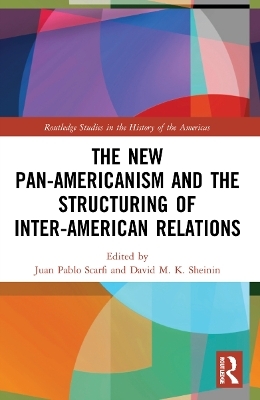
The New Pan-Americanism and the Structuring of Inter-American Relations
Routledge (Verlag)
978-1-032-18063-2 (ISBN)
What is Pan-Americanism? People have been struggling with that problem for over a century. Pan-Americanism is (and has been) an amalgam of diplomatic, political, economic, and cultural projects under the umbrella of hemispheric cooperation and housed institutionally in the Pan-American Union, and later the Organization of American States. But what made Pan-Americanism exceptional? The chapters in this volume suggest that Pan-Americanism played a central and lasting role in structuring inter-American relations, because of the ways in which the movement was reinvented over time, and because the actors who shaped it often redefined and redeployed the term. Through the twentieth century, new appropriations of Pan-Americanism structured, restructured, and redefined inter-American relations. Taken together, these chapters underscore two exciting new shifts in how scholars and others have come to understand Pan-Americanism and inter-American relations. First, Pan-Americanism is increasingly understood not simply as a diplomatic, commercial, and economic forum, but a movement that has included cultural exchange. Second, researchers, political leaders, and the media in several countries have traditionally conceived of Pan-Americanism as a mechanism of US expansionism. This volume reimagines Pan-Americanism as a movement built by actors from all corners of the Americas.
Juan Pablo Scarfi is Research Associate at the Argentine National Scientific and Technical Research Council (CONICET) and Lecturer in Global History & International Relations, University of San Andres, Argentina. David M. K. Sheinin is Professor of History at Trent University.
Introduction: The Pan-American Shift from Apology for Empire to Imperial Critique to Latin American Agency 1. Imperial Pan-Americanism 2. Architects, Exchange, and the Consolidation of Pan-American Cooperation, 1914–40 3. Becoming the Third World: Pan-Americanism, South Americanism, and Liberal Economics in the 1920s 4. Pan-American Intellectual Cooperation: Emergence, Institutionalization, and Fields of Action 5. Popular Pan-Americanism, North and South: International Relations and the Idea of "American Unity" in Argentina and the United States, 1939–45 6. The Colombo-Lanusse Doctrine: Cold War Anti-interventionism and the End of Pan-Americanism 7. Pan-American Human Rights: The Legacy of Pan-Americanism and the Intellectual Origins of the Inter-American Human Rights System 8. Epilogue: Pan-Americanism and the Changing Nature of US Hegemony
| Erscheinungsdatum | 07.02.2022 |
|---|---|
| Reihe/Serie | Routledge Studies in the History of the Americas |
| Verlagsort | London |
| Sprache | englisch |
| Maße | 152 x 229 mm |
| Gewicht | 453 g |
| Themenwelt | Geschichte ► Allgemeine Geschichte ► Neuzeit (bis 1918) |
| Geisteswissenschaften ► Geschichte ► Regional- / Ländergeschichte | |
| Sozialwissenschaften ► Politik / Verwaltung | |
| Sozialwissenschaften ► Soziologie ► Spezielle Soziologien | |
| ISBN-10 | 1-032-18063-3 / 1032180633 |
| ISBN-13 | 978-1-032-18063-2 / 9781032180632 |
| Zustand | Neuware |
| Haben Sie eine Frage zum Produkt? |
aus dem Bereich


